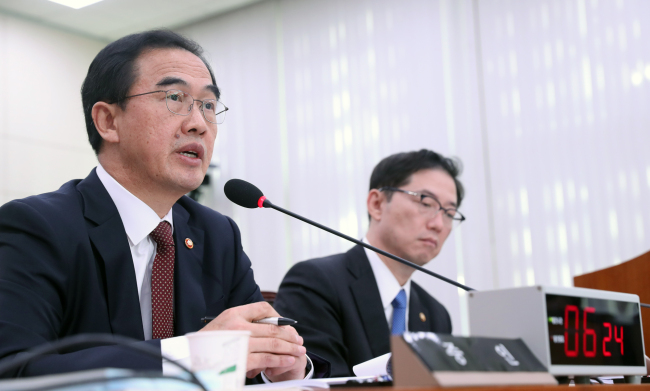South Korea will continue to make efforts to bring North Korea to dialogue for denuclearization, Seoul’s unification minister said Friday.
“We will maintain a strong policy stance against North Korea’s provocations, while pursuing a fundamental and peaceful resolution for the North’s nuclear issues as a nation directly involved in the issues surrounding the Korean peninsula,” Unification Minister Cho Myoung-gyon told lawmakers during a parliamentary audit.
 |
Unification Minister Cho Myoung-gyon speaks during a parliamentary audit at the National Assembly on Friday. (Yonhap) |
“The government will also focus on bringing the North to the negotiation table for denuclearization with the international community, through strong sanctions and pressure. Efforts to improve the inter-Korean relationship including dialogue and interaction will continue as well,” he said.
Cho’s statement is in line with Foreign Minister Kang Kyung-wha’s comment a day earlier that the government would “actively push to induce the influence that China and Russia have over the North” to build a foundation for denuclearization talks.
During the audit session, the Unification Ministry also said it maintains its initial stance of separating humanitarian aid to the North from political and military consideration. Seoul’s decision to send $8 million of aid to Pyongyang via UN agencies has ignited concerns among those who support sanctions and pressure as the sole means to bring about the North’s denuclearization.
The timeframe of the aid project will be decided based on the situation regarding North Korean issues.
Regarding cross-border civilian exchanges, the ministry has since May approved a total of 131 proposals for contact with the North, and among those, 95 took action. However, North Korea responded to only 55 of the calls.
Cho also revealed that the ministry detected signs of North Korea operating its own hydroelectric power plant near the joint industrial park in Kaesong. The news comes amid growing suspicions of Pyongyang’s unilateral operation of the park, which was closed in 2016 over suspicions it was funding the North’s nuclear program.
Seoul previously warned Pyongyang that such action would be a violation of inter-Korean agreements protecting South Korean firms’ assets in the zone and blatant disregard for the latest United Nations Security Council sanctions banning the North’s textile exports. About 58 percent of the operators there reportedly engaged in textile-related businesses.
Despite Seoul’s ongoing efforts to revive direct dialogue channels with Pyongyang, the reclusive regime has remained silent over such offers.
In July, the Moon administration proposed military talks and a separate Red Cross meeting with North Korea at the truce village of Panmunjeom. The invitation was aimed at reviving inter-Korean dialogue channels and a fresh round of reunions for families separated by the Korean War.
But North Korea had remained silent toward both proposals, which many government officials and experts here interpreted as a sign of refusal.
Earlier this month, Cho urged the North to break its silence over the reunion of families separated by the Korean War (1950-53).
“Two years have passed since the reunions of separated families were suspended,” Cho said, referring to the event which was last held in October 2015. The unification minister added that reinstating the event should be the first step toward peace and reconciliation between the two nations.
By Jung Min-kyung (
mkjung@heraldcorp.com)








